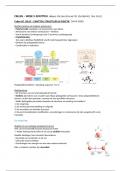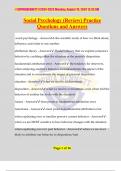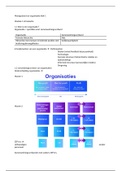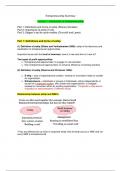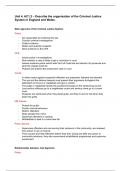Summary Company Law
Table of Contents
Week 1 - Freedom of Establishment in the EU & Company Migration .................... 2
Week 2 - The division of powers: the board & employees ....................................... 14
Week 3 - Shareholders & internal division of power ............................................... 31
Week 4 - Crossing borders: cross border mergers, divisions, conversions and the
European Company...................................................................................................... 36
Week 5 – Takeovers ..................................................................................................... 52
Week 6 - The Market for Corporate Control II: Judicial Review of Board Decisions
........................................................................................................................................ 60
Week 7 Company law tutorial 7 .................................................................................. 73
1
,Week 1 - Freedom of Establishment in the EU & Company Migration
Freedom of Establishment throughout Europe can be found in:
- Natural persons (art. 49 TFEU= restrictions on freedom of establishment of
nationals of MS.)
- Legal persons (companies and firms) (Art 45 jo. 54 TFEU= companies are nationals
therefore freedom of establishment.
à It means:
a. the right to set up a company in any EU country (art. 49 TFEU)
b. the right to use the company in that EU country. But this depends on the relevant
connecting factor. Connecting factor: what the law needs for you to be connected
to a jurisdiction (and therefore can rely on art 54 TFEU, as a national of a MS).
Legal entities are creatures of the law of the MS. The MS can decide what relates
them to a company. EU has not harmonized company law, and every MS has its
own company law. And each MS can decide what their requirements is for a
company and what their connecting factor is e.g.:
(1) registered office (place of incorporation)
(2) central administration (head office/ headquarters)
(3) principle place of business (art 54)
FOE includes: 1) natural person set up company wherever in the EU
2) company incorporates another subsidiary
3) move company abroad
4) merge companies from different MS
Goal of the EU: single market and freedom to choose. In Europe you can establish a
company outside the place where your main activities take place.
Definitionsà
Conversion: you convert into a national law of a MS.
Reincorporation: you are going back to a MS you have already been.
Applicable law
-Decided by MS: companies are creatures of national law.
Traditionally two theories:
• Real seat: This conflict rule takes the place of a company's central management and
control, in other words, its headquarters, as a connecting factor for the applicability
of national company law. Company matters are governed by the law of the country
where the "administration office", i.e. center of management and control is situated.
2
, Reason to hold on this theory: having influence on companies doing business in your
state (if they follow the incorporation theory; there is no regulation in the business
state). (head office/ headquarters) [Austria, Belgium, France, Germany, Greece,
Portugal and Spain]
• Incorporation: Company matters are governed by the law under which the company
has been duly incorporated (registered office). [The Netherlands, UK, Ireland and,
with variations, the Scandinavian countries]
Most countries are leaning into the incorporation theory. But the EU law does not obligate a
MS to apply one or the other theory.
Advantages vs Disadvantages
• Real seat
- Advantages:
1. Reasonable: law of the country the company is most closely
connected to applies (why set up in A if you are doing business is B?)
2.abuse of foreign law hardly possible
3.‘fairness’: equal company law market conditions for all players on
market
-Disadvantages:
1.a company’s ‘real seat’ may well turn out be hard to
determine
2.cross-border cooperation and transfer of company
seats are frustrated
• Incorporation:
- Advantages:
1.flexible/lenient: freedom to choose the applicable law
2.legal certainty and predictability
3.attractive to (foreign) investors
4.reciprocity: mutual recognition of companies and mobility
5.seat transfers (i.e. of headquarters) allowed
-Disadvantages:
1.‘race for the bottom’/’rat race’; ‘Delaware’ effect; ‘beauty
contest’ --> deregulation to make a jurisdiction more attractive
3
, 2.unequal competition conditions at the domestic markets for
home/foreign investors
3.evasion
What is a seat of a company:
• Registration office/statutory seat
• Management and control centre / Head office/ principle place of business etc.
• The use of connecting factors: These are connecting factors used by the law to tie a
legal concept to a company.
When solving a case à When a company is moving:
1. Is it possible to move? (art. 49 & 54 TFEU)
2. Always look if they are moving there registered or head office, or both (=crossborder
conversion).
3. And if it is an outbound or inbound transfer? (outbound: home MS is being
problematic / inbound: host MS is being problematic)
4. Application of relevant Case Law
5. Reasoning/Application to the case
Types of company:
Partnership: (VOF). The main thing is that there should be 2 or more
people/directors/founders. They are also basically liable without a limit. (it is also an example
of a non-stock corporation) With regards to tax: partners have to pay income tax, whereas if
you establish a company, you have to pay company tax.
Limited liability: the firms owners (shareholders, director etc.) are only liable in the extent
that they invested in the company.
Distinction private and public: public company means that you’re listed on the stock
exchange. Private means only a limited amount of people can have stocks. NL examples:
public is NV, private is BV. Germany example: public is GMBH, private is GA.
Private companies, the main thing is that you cannot easily transfer shares or not at all. In the
code of conduct you can state that shares may be transferred and to whom. This is not like
this at the public companies. There, there is a loss of control.
Subsidiary and branch:
Subsidiary: a company that its shares are owned by another (parent) company. à so it’s
basically a separate legal entity. It may or may not conduct the same business activities as the
parent company. They are also separately liable (normally).
4
Table of Contents
Week 1 - Freedom of Establishment in the EU & Company Migration .................... 2
Week 2 - The division of powers: the board & employees ....................................... 14
Week 3 - Shareholders & internal division of power ............................................... 31
Week 4 - Crossing borders: cross border mergers, divisions, conversions and the
European Company...................................................................................................... 36
Week 5 – Takeovers ..................................................................................................... 52
Week 6 - The Market for Corporate Control II: Judicial Review of Board Decisions
........................................................................................................................................ 60
Week 7 Company law tutorial 7 .................................................................................. 73
1
,Week 1 - Freedom of Establishment in the EU & Company Migration
Freedom of Establishment throughout Europe can be found in:
- Natural persons (art. 49 TFEU= restrictions on freedom of establishment of
nationals of MS.)
- Legal persons (companies and firms) (Art 45 jo. 54 TFEU= companies are nationals
therefore freedom of establishment.
à It means:
a. the right to set up a company in any EU country (art. 49 TFEU)
b. the right to use the company in that EU country. But this depends on the relevant
connecting factor. Connecting factor: what the law needs for you to be connected
to a jurisdiction (and therefore can rely on art 54 TFEU, as a national of a MS).
Legal entities are creatures of the law of the MS. The MS can decide what relates
them to a company. EU has not harmonized company law, and every MS has its
own company law. And each MS can decide what their requirements is for a
company and what their connecting factor is e.g.:
(1) registered office (place of incorporation)
(2) central administration (head office/ headquarters)
(3) principle place of business (art 54)
FOE includes: 1) natural person set up company wherever in the EU
2) company incorporates another subsidiary
3) move company abroad
4) merge companies from different MS
Goal of the EU: single market and freedom to choose. In Europe you can establish a
company outside the place where your main activities take place.
Definitionsà
Conversion: you convert into a national law of a MS.
Reincorporation: you are going back to a MS you have already been.
Applicable law
-Decided by MS: companies are creatures of national law.
Traditionally two theories:
• Real seat: This conflict rule takes the place of a company's central management and
control, in other words, its headquarters, as a connecting factor for the applicability
of national company law. Company matters are governed by the law of the country
where the "administration office", i.e. center of management and control is situated.
2
, Reason to hold on this theory: having influence on companies doing business in your
state (if they follow the incorporation theory; there is no regulation in the business
state). (head office/ headquarters) [Austria, Belgium, France, Germany, Greece,
Portugal and Spain]
• Incorporation: Company matters are governed by the law under which the company
has been duly incorporated (registered office). [The Netherlands, UK, Ireland and,
with variations, the Scandinavian countries]
Most countries are leaning into the incorporation theory. But the EU law does not obligate a
MS to apply one or the other theory.
Advantages vs Disadvantages
• Real seat
- Advantages:
1. Reasonable: law of the country the company is most closely
connected to applies (why set up in A if you are doing business is B?)
2.abuse of foreign law hardly possible
3.‘fairness’: equal company law market conditions for all players on
market
-Disadvantages:
1.a company’s ‘real seat’ may well turn out be hard to
determine
2.cross-border cooperation and transfer of company
seats are frustrated
• Incorporation:
- Advantages:
1.flexible/lenient: freedom to choose the applicable law
2.legal certainty and predictability
3.attractive to (foreign) investors
4.reciprocity: mutual recognition of companies and mobility
5.seat transfers (i.e. of headquarters) allowed
-Disadvantages:
1.‘race for the bottom’/’rat race’; ‘Delaware’ effect; ‘beauty
contest’ --> deregulation to make a jurisdiction more attractive
3
, 2.unequal competition conditions at the domestic markets for
home/foreign investors
3.evasion
What is a seat of a company:
• Registration office/statutory seat
• Management and control centre / Head office/ principle place of business etc.
• The use of connecting factors: These are connecting factors used by the law to tie a
legal concept to a company.
When solving a case à When a company is moving:
1. Is it possible to move? (art. 49 & 54 TFEU)
2. Always look if they are moving there registered or head office, or both (=crossborder
conversion).
3. And if it is an outbound or inbound transfer? (outbound: home MS is being
problematic / inbound: host MS is being problematic)
4. Application of relevant Case Law
5. Reasoning/Application to the case
Types of company:
Partnership: (VOF). The main thing is that there should be 2 or more
people/directors/founders. They are also basically liable without a limit. (it is also an example
of a non-stock corporation) With regards to tax: partners have to pay income tax, whereas if
you establish a company, you have to pay company tax.
Limited liability: the firms owners (shareholders, director etc.) are only liable in the extent
that they invested in the company.
Distinction private and public: public company means that you’re listed on the stock
exchange. Private means only a limited amount of people can have stocks. NL examples:
public is NV, private is BV. Germany example: public is GMBH, private is GA.
Private companies, the main thing is that you cannot easily transfer shares or not at all. In the
code of conduct you can state that shares may be transferred and to whom. This is not like
this at the public companies. There, there is a loss of control.
Subsidiary and branch:
Subsidiary: a company that its shares are owned by another (parent) company. à so it’s
basically a separate legal entity. It may or may not conduct the same business activities as the
parent company. They are also separately liable (normally).
4

